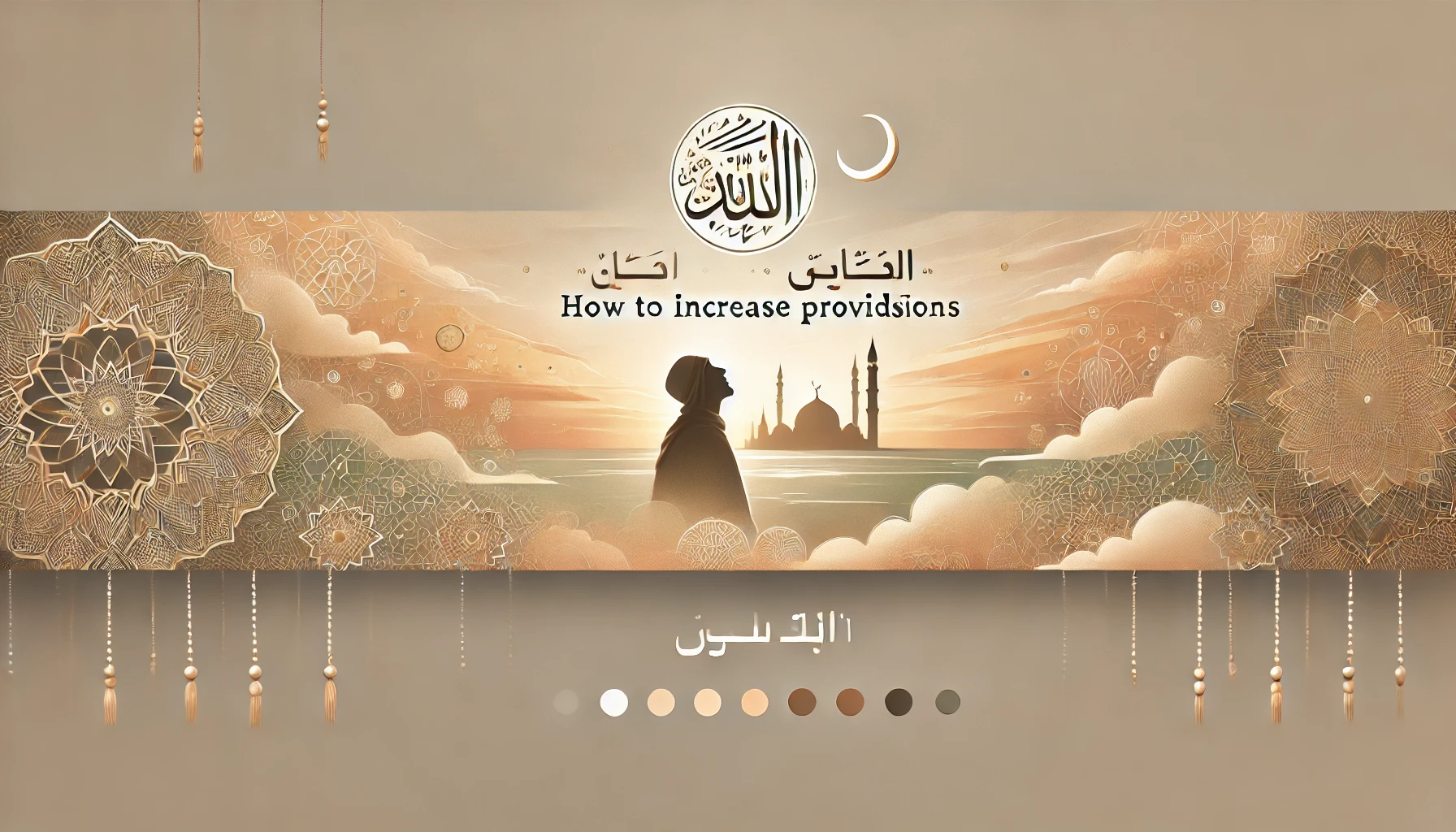In Islam, the concept of Rizq in Islam (رِزْق) is deeply woven into the fabric of our faith and understanding of life. It is often translated as “provision” or “sustenance,” but it carries a broader meaning that encompasses everything Allah provides for us, including wealth, health, knowledge, opportunities, and even relationships.
What Is Rizq?
Rizq is not limited to financial wealth or material possessions. It refers to anything that sustains and benefits us, whether it be physical, emotional, or spiritual. Allah سبحانه وتعالى is the ultimate provider, as He mentions in the Qur’an:
اللَّهُ يَبْسُطُ الرِّزْقَ لِمَنْ يَشَاءُ وَيَقْدِرُ
“Allah extends provision for whom He wills and restricts it.”
— (Surah Ar-Ra’d, 13:26)
This means that Allah decides how much Rizq we are to receive, and no one else has the power to change that without His permission. While we must strive and work hard, it is ultimately Allah who determines our sustenance.
Types of Rizq
Islam teaches us that there are two main types of Rizq:
- Material Rizq (رِزْقٌ مَادِّي)
This includes tangible provisions such as money, food, shelter, clothing, and all the physical necessities of life. - Spiritual Rizq (رِزْقٌ رُوحَانِيّ)
Spiritual provisions include things like faith, wisdom, knowledge, and a peaceful heart. Having a connection with Allah, feeling contentment, and gaining beneficial knowledge are all forms of Rizq.
Islamic Teachings on Rizq: A Balanced Perspective
Islam encourages a balanced approach to seeking and utilizing Rizq. The Prophet Muhammad ﷺ taught his followers that while it is important to work hard and seek provision, one must also trust in Allah’s decree. We are instructed to neither excessively chase after wealth nor neglect the means of earning it. Instead, we are encouraged to be grateful and content with what we have.
The Prophet ﷺ said:
لَوْ أَنَّكُمْ تَتَوَكَّلُونَ عَلَى اللَّهِ حَقَّ تَوَكُّلِهِ لَرُزِقْتُمْ كَمَا تُرْزَقُ الطَّيْرُ تَغْدُو خِمَاصًا وَتَرُوحُ بِطَانًا
“If you were to rely upon Allah with the reliance He is due, you would be provided for like the birds: they go out in the morning hungry and return full in the evening.”
— (Sunan At-Tirmidhi, Hadith 2344; Sahih)
This Hadith emphasizes that trust in Allah (Tawakkul) should accompany our efforts. Just as the birds leave their nests every day in search of food, we too should make an effort while maintaining faith that Allah will provide.
How to Increase Your Rizq: Practical and Spiritual Steps
While Allah has already decreed everyone’s portion of Rizq, there are certain actions that can lead to its growth or increase:
1. Maintaining Taqwa (God-Consciousness)
Allah tells us in the Qur’an:
وَمَن يَتَّقِ اللَّهَ يَجْعَل لَّهُ مَخْرَجًا وَيَرْزُقْهُ مِنْ حَيْثُ لَا يَحْتَسِبُ
“And whoever fears Allah – He will make for him a way out and will provide for him from where he does not expect.”
— (Surah At-Talaq, 65:2-3)
Taqwa, or being mindful of Allah, brings blessings in ways we cannot foresee. Leading a life of piety and sincerity leads to barakah (blessings) in one’s provision.
2. Offering Salah (Prayer) and Seeking Forgiveness
The Prophet ﷺ taught that constantly asking for forgiveness (Istighfar) brings about Rizq. In Surah Nuh, Prophet Nuh (Noah) is quoted as advising his people:
فَقُلْتُ اسْتَغْفِرُوا رَبَّكُمْ إِنَّهُ كَانَ غَفَّارًا يُرْسِلِ السَّمَاءَ عَلَيْكُم مِّدْرَارًا وَيُمْدِدْكُم بِأَمْوَالٍ وَبَنِينَ وَيَجْعَل لَّكُمْ جَنَّاتٍ وَيَجْعَل لَّكُمْ أَنْهَارًا
“So I said, ‘Ask forgiveness of your Lord. Indeed, He is ever a Perpetual Forgiver. He will send [rain from] the sky upon you in [continuing] showers. And give you increase in wealth and children and provide for you gardens and provide for you rivers.’”
— (Surah Nuh, 71:10-12)
Salah and Istighfar not only cleanse us spiritually but also open the doors of sustenance.
3. Giving Charity (Sadaqah)
Giving in charity, paradoxically, increases wealth. The Prophet ﷺ said:
مَا نَقَصَتْ صَدَقَةٌ مِّن مَّالٍ
“Charity does not decrease wealth.”
— (Sahih Muslim, Hadith 2588)
When we give for the sake of Allah, we purify our wealth and attract more blessings into our lives. The reward is often multiplied in ways that we cannot imagine.
4. Being Grateful (Shukr)
Gratitude is a key to increasing Rizq. Allah promises in the Qur’an:
لَئِن شَكَرْتُمْ لَأَزِيدَنَّكُمْ
“If you are grateful, I will surely increase you [in favor].”
— (Surah Ibrahim, 14:7)
Recognizing and thanking Allah for the Rizq we already have brings more blessings and abundance.
Role Models of Trust in Rizq: Prophets and Pious People
The lives of the Prophets and the righteous provide excellent examples of how to view and deal with Rizq. Here are a few role models:
1. Prophet Ibrahim (Abraham) عليه السلام
Prophet Ibrahim demonstrated complete trust in Allah’s provision. When he left his wife Hajar and son Isma’il in the barren desert, he placed his trust in Allah to provide for them. Their story teaches us that when we rely on Allah, He will open doors of sustenance, even from the most unexpected places. The well of Zamzam, which continues to provide water to this day, is a testament to that trust.
2. Prophet Muhammad ﷺ
The Prophet Muhammad ﷺ lived a life of simplicity and contentment. Even though he was the leader of the Muslims and had access to wealth, he chose to live humbly, often sleeping on a mat and eating the simplest of foods. His trust in Allah’s Rizq was unwavering, and he constantly reminded his followers that true richness is the richness of the soul.
3. The Companions (Sahaba)
Many of the Sahaba (companions of the Prophet ﷺ) demonstrated immense reliance on Allah for their sustenance. Abu Bakr As-Siddiq رضي الله عنه, for example, was known for giving all his wealth in charity, trusting fully in Allah’s provision. His generosity and trust in Rizq made him one of the most beloved companions to the Prophet ﷺ.
Conclusion: Trust in Allah’s Provision
Rizq is a comprehensive concept in Islam that extends beyond material wealth. It encompasses all of Allah’s blessings—physical, spiritual, and emotional. While we are required to make an effort to earn our livelihood, we must remember that it is ultimately Allah who provides, and He does so in ways that are best for us.
By practicing gratitude, giving charity, seeking forgiveness, and living with Taqwa, we can increase the blessings in our Rizq. As Muslims, we are encouraged to trust in Allah’s wisdom, work hard, and remember that true success lies in contentment with what Allah has decreed for us.
Let us follow the footsteps of the Prophets and the pious in seeking, growing, and being grateful for the Rizq that Allah has given us. May Allah grant us all barakah in our provisions, both in this world and the next. Ameen.


